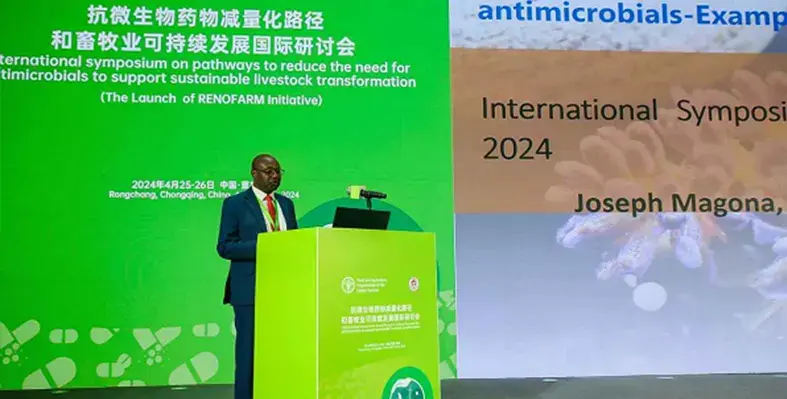The International Symposium on Pathways to Reduce the Need for Antimicrobials to Support Sustainable Livestock Transformation (RENOFARM) took place from 25-26 April in Chongqing, China
Stakeholders, experts and politicians from around the globe gathered at the RENOFARM symposium last month, to discuss the pressing issue of antimicrobial resistance (AMR) which is becoming a serious problem across Africa, particularly in the agriculture sector. By taking part, AU-IBAR demonstrated its dedication to fighting antimicrobial resistance and promoting sustainable livestock practices among African Union member states.
The symposium which was in line with the goals of the African Union Commission (AUC) and the African Union Framework for Antimicrobial Resistance Control (2020-2025), was convened by the Food and Agriculture Organisation (FAO) to present the project, encourage participation, and pinpoint important approaches to put it into action. Besides enhancing the worldwide response to AMR, the symposium also promoted One Health concepts through collaborations with groups like AU-IBAR.
The significance of customised strategies for various livestock value chains was further emphasised at the symposium, which also brought attention to the priorities and difficulties encountered by African Union member states in executing RENOFARM. Throughout the symposium, various sessions and presentations addressed critical issues related to reducing the need for antimicrobials. Topics ranged from EU One Health actions and biosecurity measures to national action plans and good production practices. Key achievements included the launch of the RENOFARM initiative, the exchange of country and regional priorities, and the issuance of the Rongchang Statement outlining future actions. Participants emphasised the importance of accelerating the implementation of national action plans, strengthening evidence-based policy-making, and promoting international collaboration.
A presentation titled 'Alternatives to Antimicrobials to Reduce the Need for Antimicrobials - Examples from African Union Member States,' was also delivered by AU-IBAR's AMR Expert, Dr Joseph Magona, providing valuable insights into the key pathways for implementing RENOFARM within African Union member states. In addition, he also shed light on alternative strategies to mitigate antimicrobial use in various livestock value-chains, emphasising the importance of good husbandry practices, vaccination, and biosecurity measures.





